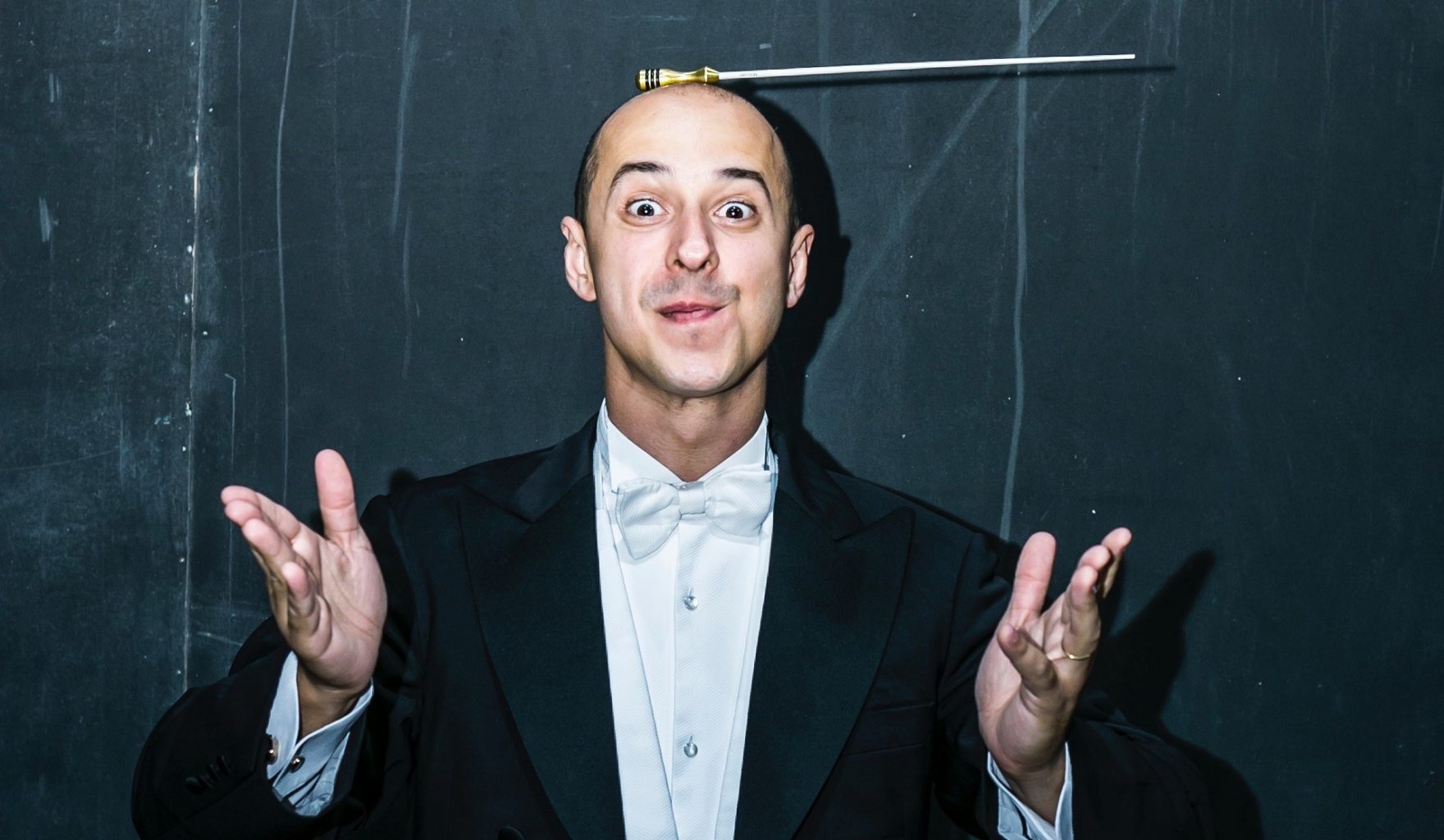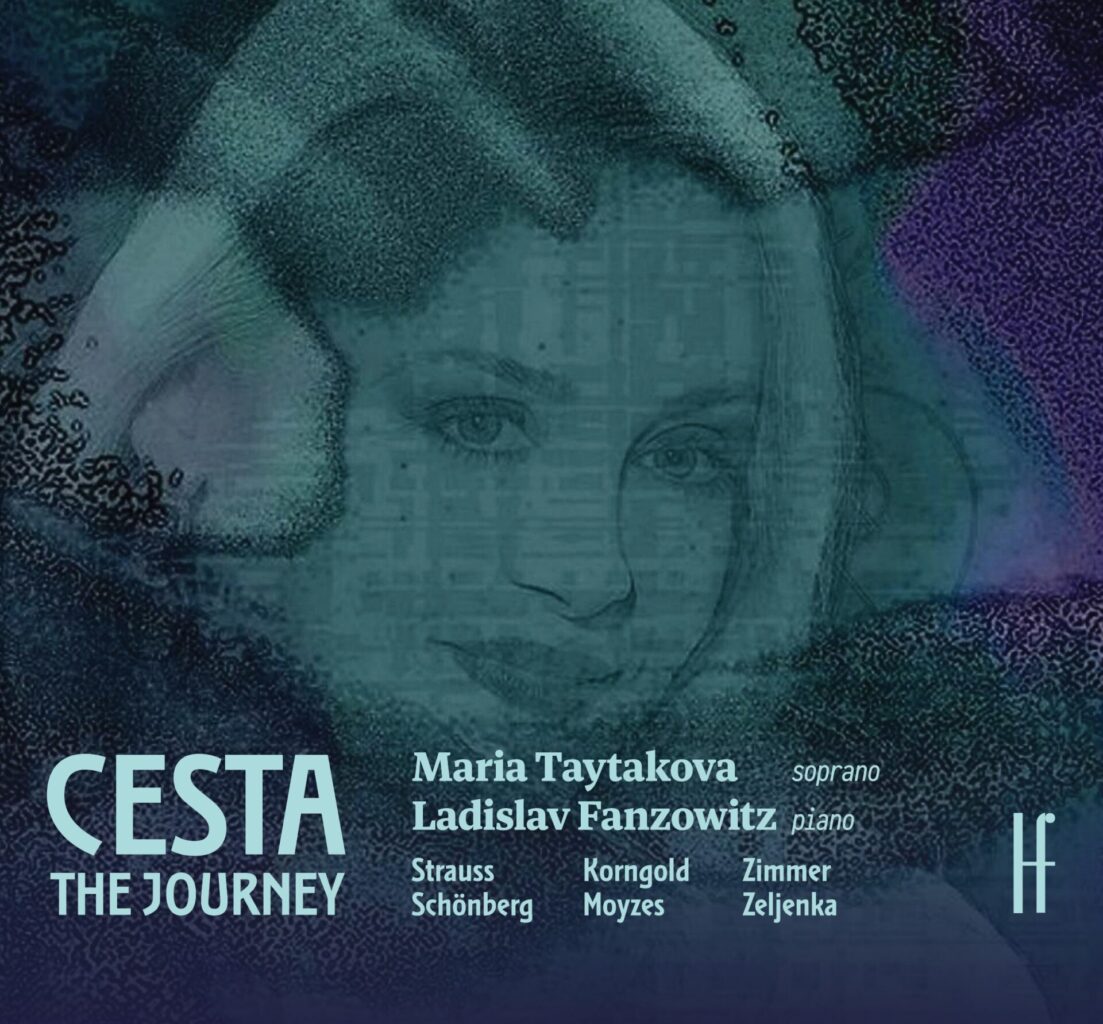“If I have to say the truth, this would be a dream of every conductor. I rehearsed with them, I presented the way I wanted the music and at one point they did it without me. They reacted, they learnt it. They learnt how to listen to the singers during the recitatives. They learnt when they had to play. So they worked together, because they were listening to each other,” conductor Vinicius Kattah talks about the cooperation with the orchestra of the Košice State Theater.
Let’s start the interview with the premiere of The Magic Flute in Košice. You introduced a new concept that conservative audiences may not have accepted. Nevertheless, people accepted it. Are we ready for progressive, new sound, innovative elements in Mozart’s music?
I was really happy about the reactions of the audience. Especially because it is my second premiere of Mozart in Košice State Theatre so after Don Giovanni I have to be completely true, I was a little bit more worried. They told me at that time I had a new style with appoggiaturas, cadenzas and new sound which might be not accepted, so I was worried. But I have got really good critic especially musically so that Košice was actually ready for that and what surprised me, that all the critics knew at the times of Don Giovanni premiere that it was not something unusual. They knew it was something different, but that I had my sources for my historically informed performance. They really accepted it. With The Magic Flute I wanted to do something different too, but not only had I to do something different. I wanted to present it as possibly as it only goes to Mozart´s style. And the reaction of the musicians and the singers was: would people like it? But they accepted it and they know there is a reason to do that. But talking about the audience I was quite happy.
Yes, this was my question. First of all I would like to ask you about the audience, because the critics understand the new conceptions and trends in music, but maybe not really the conservative audience. And let´s say the truth. Do you think there is a progressive audience in Košice?
I haven´t been here for a long time, but I think that the audience react in a positive way to some changes especially when we talk about music. I would say Košice is quite progressive if you talk about music and if you can prove yourself and if you can show them the details. The same thing happened when I came to conduct here the premiere of La Traviata. The tempos were a little bit different and in the interpretation I used many unusual things, but the audience accepted it very well. On the other hand if we talk about staging I would say they are much more traditional then on the musical side.
You referred to the manuscript of the Magic Flute score in which you found new cadences that Mozart had cut out, so that was the first moment of innovation. Can our opera singers improvise today? How was the rehearsal process with them?
I would say nowadays for the singer to completely sing in the old style, they would need to specialize only to that style. Every time I have a rehearsal with them I tell them, look: a singer during the baroque period could only sing baroque music from one country. If you were in Paris, you would have learnt how to improvise, how to do music on the French way. If the same musician went to Italy, it would be completely different. And we are talking just about one style. At Mozart style it was exactly the same. And the road opened a little bit at Mozart´s time, so we have classical music was not so different, but even though they were different at that time. For example if we get the flute treatise by Quantz or violin treatise by Leopold Mozart, they would say that they would do trills in a different ways. They improvised in different ways. And Mozart grew up in Austria and everything he learnt, he learnt from his father. So what I always took as guaranteed is Leopold Mozart´s violin´s score, his book about how to play, how to improvise. He talked about the violin, because Leopold Mozart taught violin, but everything he wrote is about music the 18th century. So what I did I sat down at my piano, I got my piano score from Bärenreiter, because I always use Bärenreiter music sheet for Mozart, because it is the best from the best and then I wrote down myself the appoggiaturas, the cadenzas, the ornamentations, I wrote it down as a suggestion. Then I sent it to all the singers before I rehearsed with them and I told them: please take a look at that, learn it with appoggiaturas. Then we had the rehearsals and they sang it exactly the way I wanted and I showed them some other ideas to sing it in another way I thought. But then I wanted to put a little bit of paprika on that. So I told them. OK that is the basic, but if you feel that you could do something else, do it during the rehearsal period. Maybe not all of them, but let´s say 40 percents of them tried some new appoggiaturas and new ornamentations. And enjoyed it! And they liked it!
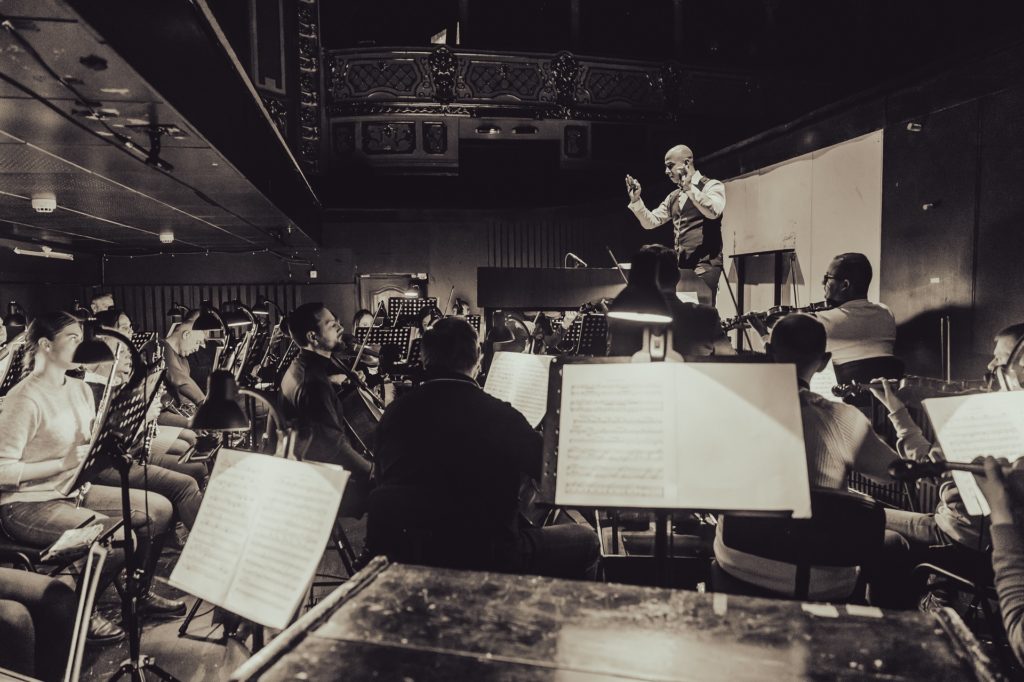
Are you sure? Because this is something completely new for them. And the singers are not really used to this kind of process of improvisation on rehearsals… Mozartian singing is completely different from the romantic arias. Did you try to correct the opera soloists from a technical and aesthetic point of view? Did you have enough time to work with them?
It was a beautiful process, because at some point the ornamentations came and that´s what Mozart wanted. Some of them were really happy. Of course during the process I had to stopped them and tell them that they forgot some appoggiaturas or for example taking breathes between the sentences. Many of them are use to sing in a romantic way of singing, so they think that when I can sing this whole line without taking a breath, it´s beautiful. But I said, this is not opera, not the theatre not the Singspiel of Mozart anymore, because everything is about the text. So I told them: If you have a comma or dot, you have to take a breathe there, because you have to give the emphasis on a certain word. So all those details I worked with them. And of course, as we always know. They’re gonna be some singers, that gonna understand that and they´re gonna do it, but they’re gonna be some singers that you can tell ten times and they´re not gonna understand it. And at the performance they will do it in a way they always used to sing. This thing happend during the process of the Magic Flute and more during Don Giovanni, but generally they enjoyed it especially when I’m talking about the main characters. The Papagenos did a very good job, because they had many ornamentations and in both arias when they repeated they added something new. Adding something new, adding different tempos, appoggiaturas and cadenzas – they really enjoyed it!
For these improvisations you also need good musicians, I mean the singer of Papageno is a naturally good musician, you can feel the difference…
Yes! And I must say you have good musicians in Slovakia. It is something similar that we have in Brazil. In Slovakia you have such a coacher for folk music and many of opera singers are used to sing folk music, they like it and it is very close. If we think of the way how to improvise Mozart´s music, it is very similar to folklore tradition, so I think the singers understand the process.
We already mentioned the role of Papageno and now the role of the Queen of the Night. You added challenging notes to the key aria performed by Lucie Kaňková, which the audience knows very well, we could say every single note. Wasn’t it a risk, how this well-known aria, changed, will be accepted by the audience? What was the process like?
I was really happy with Lucie, because it was really what I expected. Lucie was singing the role of the Queen of the Night in many opera houses already. She has a beautiful voice and the high f that she sings are very rare. At the first rehearsal she wanted to talk about tempo. She was like: maestro, I would like the tempo a little bit faster, but I sat at the piano and I told her: Lucie, come here, let´s talk about music. And then I explain her a little bit about appoggiaturas, agogics, and tempos moving fast or back. She looked at me and asked me: what is that? And I told her: This is music! (Laughing) Of course, I was trying to be nice to her, because at one point in your life you are singing this aria as you have sung it many times and there is no problem in doing that way, but at one point it requires to talk about the text, to talk about different other things. And I saw on her face, that she was really happy about that. And she did it. First half on hour we were talking about different things concerning interpretation and in the end I told her, that I have a special thing that I have done already with one soprano singer in Vienna. And I told her about the high f, that she holds.
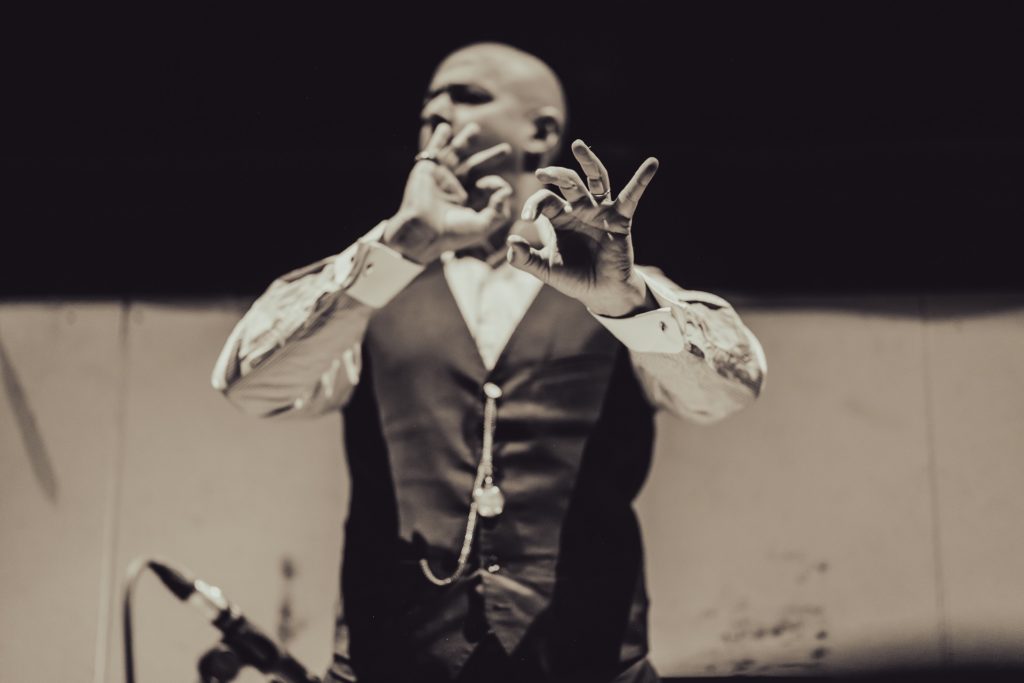
Well, it was quite risky, no?
Yes! (Laughing) First she looked at me and I saw in her eyes a question: are you crazy? And I told her, that it is beautiful, it sounds fantastic and then she said that she wants to try it. When I sat on the piano, I played it and she sang it on the first time. She loved it; she had a lot of fun! One day before the premiere she came to me and told me, that she is going to do all the appoggiaturas, but not the high f during the first premiere evening. And I told her: it´s up to you! It´s a possibility, I´m sure, you can do it, I don´t have any doubts. She answered, that was too risky, she was not sure about the reactions of the audience and the critic. But then at the night of the first premiere she came to me and I told her: Lucy, sing it! And she asked: Are you sure? And I said: I´m sure. You´ re gonna do it, you´re gonna be great. If you want to show something new and impress, you have to do it on the first night and not to wait until the second night or future performances. Do it now! She did not answer me.
So you did not know until the moment she sang it how was Lucie Kaňková going to decide? This is a big surprise…
No, I did not know it. During the second aria I started to conduct in a slower tempo. I could not conduct it very fast; otherwise it would be very risky. So I took the tempo a little bit slower and then two bars before the high f I looked at her and I looked in her eyes and I was thinking: Do it, sing it, you can do it! She looked at me and I know she felt it and sang it. It was really amazing! It was really beautiful!
So that was a real improvisation at the premiere evening! Did you tell it after the performance to anyone?
Actually no! But it was really a fantastic moment!
Yes, I do agree. That´s how real artist should work like. But let´s go now to your interpretation of the Overture! You performed it in a really fast tempo, actually, under 6 minutes; some lazy conductors perform it in 8 minutes. So congratulation!
(Laughing) Thank you! It is a good idea to stop it. I read it in the review and I was surprised. I never had an idea to find out how long it takes to perform the Overture. My wife liked that too.
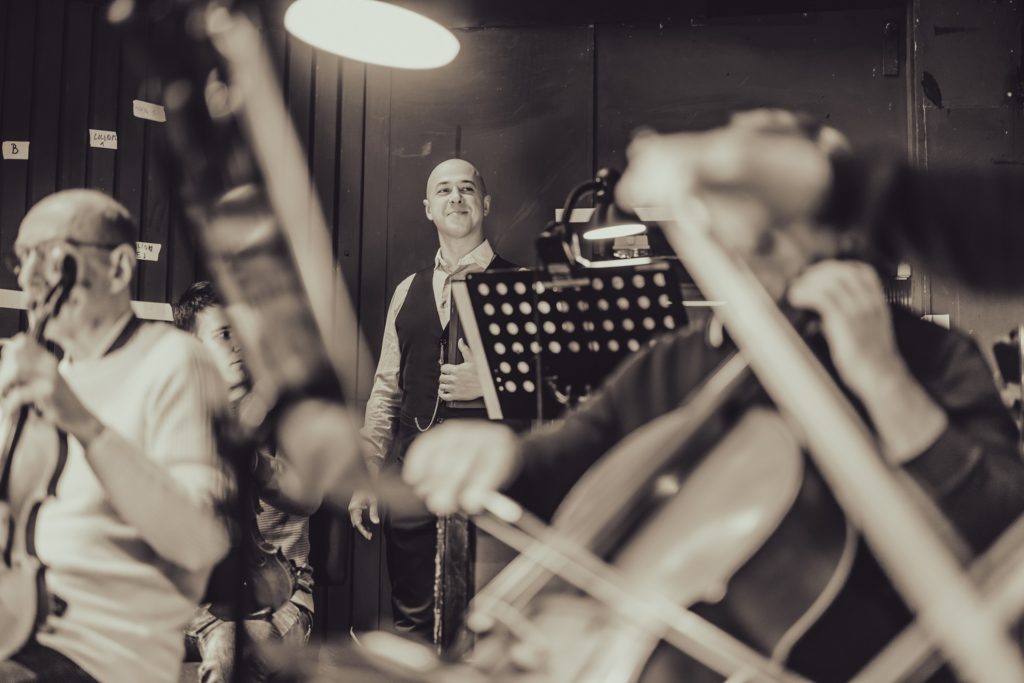
Yes, it´s kind of adrenalin sports during the performance and then to compare it with the rest, mainly the lazy ones, really. (Laughing) The first part of the introduction was majestic; the Allegro was very fast. You were not afraid some problems with articulation or rhythmic misbalance that might occur? How was your cooperation with the musicians of the orchestra? They are, of course not used to historically informed interpretation. How the processes look like? Did they enjoy it?
They enjoyed it! They had fun. You can feel, that the majority and I am sure, that about 90 percent of them are really willing to do a very good music. My huge problem on the beginning of the process of the Magic Flute was that they just played Tosca and King Roger, much late romantic and modern music and Mozart requires a completely different way of playing. I have a very good friend in orchestra, he is a concert master Peter Michálik and he also plays baroque violin. So he was with me and we had a lot of work to do. To tell musicians ten times playing without vibrato, then when you have long notes, you start without vibrato and then you grow up the vibrato. But the question was how to write it down for the, because it is a huge opera! I mean, we worked a lot of on details and during the rehearsals I always stopped the orchestra yelling: Stop playing with vibrato! No vibrato! I was a little bit like Toscanini, I´m not like him really, I´m friendly and there´s a very nice atmosphere when I work with them, but as far for this I was really strict with them. I remember how everybody asked me how is going to be the Allegro. For the first time the second violins started completely slowly. I stopped the rehearsal and I sang it in the tempo I wanted to. And they looked at me with their face saying: Are you sure?
You should better say: Are you crazy?
Yes. Are you crazy? (Laughing) For the first time we managed to play until the end and then we started to work on more details, articulation, all the fortes, pianos, not to lose the tempo, to be able to keep the tempo, everything that comes with that. And I have to say that I am very happy and I am very proud of them, because they managed to do a very good job. You also felt they were willing to do it, the tempos, dynamics and all small details that we spoke they were all there. So I was very happy with it. And also this beautiful Einladung played by clarinet in the beginning of the Allegro, that we put there. I have heard many recordings, but there are not many, where they put it there. And on the manuscript of Mozart you can see those two extra two bars, that are there. Mozart finishes the orchestra and then comes this beautiful clarinet. When I first saw that in the manuscript I played the music in my head and later played it on the piano, I said by myself: I like it! It´s nice, it´s different and it was Mozart first idea. And as we know, when Mozart wrote down music, he almost never did any mistakes. So he wrote those two bars and afterwards those two bars are crossed out. It could have been Mozart, it could have been someone else, but we never gonna know, why they are crossed out. I told myself I´m gonna risk it. Also many other things. In the beginning of the First Act when Tamino comes and sings Zu Hilfe. Normally you hear oboes, bassoon, horns and the strings. For the first time Mozart wrote trumpets and timpani together. And I told myself I´m gonna try it and let´s see how it sounds with the orchestra. I liked the sound very much so we left it there.
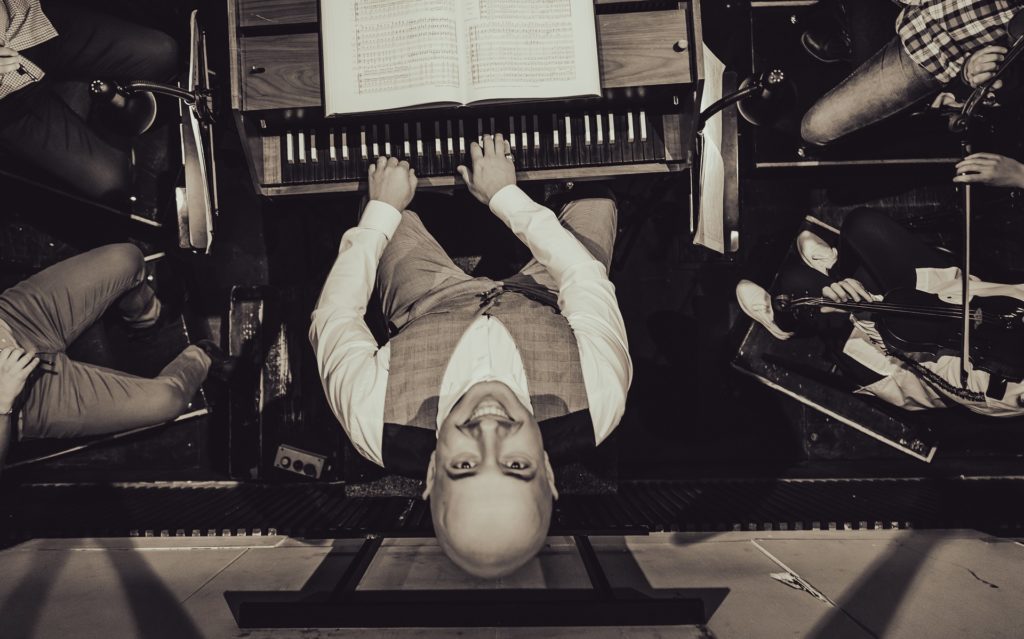
In some parts you conducted the orchestra from the harpsichord. It greatly enriched the sound. Were the musicians of the orchestra able to get used to this way of conducting? Nowadays we usually see in chamber orchestras conducting from violin or other instrument, but definitely not in opera. Was it difficult?
This was a huge work. First I conducted everything and I didn’t even have the harpsichord in front of me and when we started the rehearsals the last two weeks on stage with singers and I had already my harpsichord. Every day I played a little bit more on harpsichord and I was conducting with my eyes and other gestures that I was able when I was playing at harpsichord. At one point I got pretty nervous especially because the brass instruments and I stopped the rehearsal. I told them: Listen to me very carefully. For Mozart you don´t need any conductor. You are all musicians and this music has to work without a conductor. And then I set at the harpsichord and we played the beginning of the Second Act, I told them not to look at me and just listen to the music. And from that moment they did it without me conducting. And then I joked with the director of the opera that he actually did not need me for this opera (laughing). If I have to say the truth, this would be a dream of every conductor. I rehearse with them, I present the way I want the music and at one point they do it without me. They reacted, they learnt it. They learnt how to listen to the singers during the recitatives. They learnt when they had to play. So they worked together, because they were listening to each other! Of course, I was there, playing at harpsichord, listening to them, conducting, but they knew what to play and where to wait and that was very exciting. So I was very happy, that I could play much more on the harpsichord.
How did you come up with playing exactly the harpsichord?
At that time in 1791 Mozart was already conducting everything from the fortepiano, which has more possibilities, but before that was the harpsichord used. It was the only instrument that was able to hold the intonation of the other instruments, which were made not from very good material, so during playing they went down with intonation. It was expected from the conductor to conduct an opera from the harpsichord or from the violin. Many friends are asking me, why I am conducting from cembalo if opera has no recitativos. The cembalo was not there to play there only the recitativos, but to play the whole opera, to play the base, basso continuo and also it is a beautiful instrument, so a musician could improvise. I think the musicians and also the audience enjoyed it.
Currently, we have a trend of historically informed interpretation. We know less interesting experiments, but also really interesting ones. The first basis of this kind of interpretation is that players use historical instruments. Are you a fan of historical instruments?
Yes, I love them.
Really? How can you listen to them! They are always out of tune!
(Laughing) Yes, it´s very hard, I know. I did many things in Vienna with historical instruments and sometimes it is really horrible, because if you don´t have good musicians, it´s always out of tune.
Do you think it´s the matter of the quality of the musicians? Not the materials and the constructions of the instruments, mainly strings?
Yes, from this point of view it´s very hard. But if we talk about Mozart or Beethoven symphonies, nowadays we have all these strict rules of no applause between the movements and all these things around. This did not happened at that time. When Mozart was in Paris, he had to repeat the first movement of his Paris Symphony, because they loved it so much. And between the movements they had to tune the orchestra as well again. This was normal. Talking about historical instruments I like the brass and the wind instruments the most, especially the horns. I love the horns from the classical period.
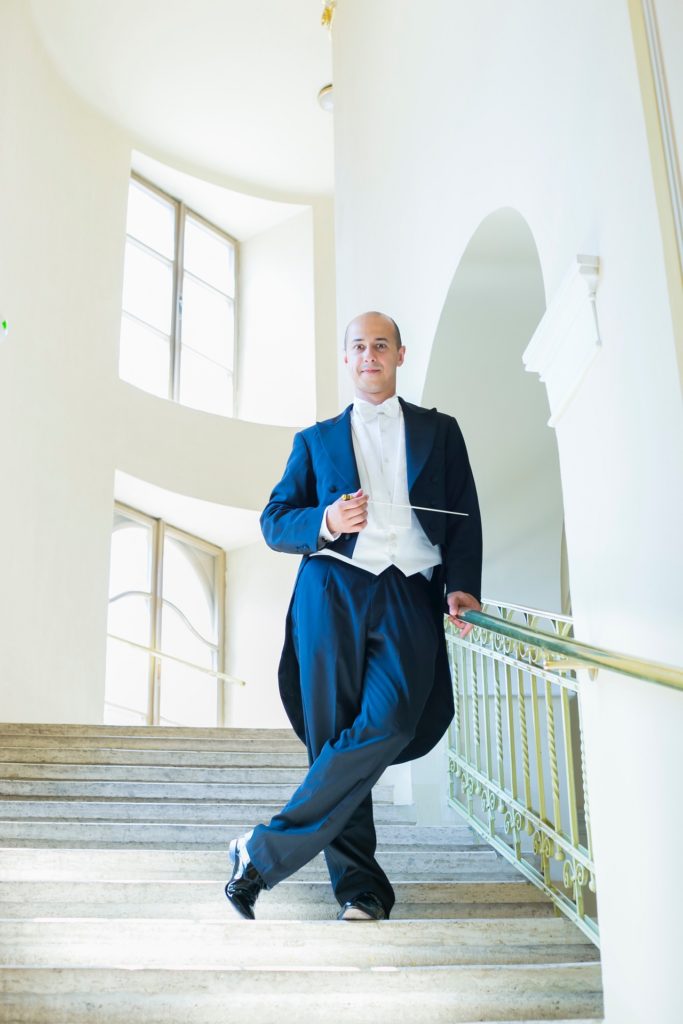
Also the oboe is very interesting, absolutely agree, the problems start with the strings instruments.
Yes, historical oboes are beautiful and also the flute. They bring completely different sound to orchestra. I like it and I don´t say that I myself would like to learn it, the only instrument that I play except cembalo and piano is my mandolin and my mandolin is a copy from 18th century. It is a fantastic sound. It is a soft sound, it´s not huge, it matches with the voices, because you don´t need huge voices Mozart. It was completely different at that time.
And by the way you always study the manuscript of the score before you start to rehears with the orchestra?
Yes, I think it´s really impressive, because on the facsimile you can only see what the composer wanted to do, rather than listening to big recordings. Especially I like the mistakes! I love looking up the mistakes! There are some mistakes when I say: Ha! Actually, it´s a good idea! And of course finding the right tempo and all these sort of stuff are really very interesting for me.
You did a research for and completed a book about the librettist Emanuel Schikaneder in Vienna. Well, maybe this could be also interesting to say in connection with The Magic Flute.
I did a research of Schikaneder, his entire story how he lived, his relationship with Mozart during the period of The Magic Flute how they work together. It was at the time when I was the first time in Vienna. I was at the library, I got manuscripts and I found The Magic Flute Part II. I looked at it, because I never heard about that, so I asked for the book, waited for one hour and my fingers where sweating. They gave me a manuscript of a publication for piano and voice. I saw the name of the librettist Emanuel Schikaneder, opera was written in 1798, so after Mozart died and composer Peter Paul von Winter. I started researching it and at that time there was completely nothing about it. Music is very interesting and I found out, that Schikaneder wanted the second part of the opera. He sang himself Papageno again, same Papagena, same Pamina, Tamino was a different one and the same Queen of the Night. So you have two arias that Peter Paul von Winter wrote with high f and I was completely surprised, because nobody recorded it yet. Of course the dialogues got lost, the manuscript of the composer got lost so I wrote about the opera and everything I could get. They did one performance at the Salzburg Festspiele.
What else you found in research that helped you to create Mozart as you interpret it today?
The best thing I got out of that was a book that I found. It was written by the composer Peter Paul von Winter. It is a book how to improvise for singers. So it´s a school of how to sing and this book was written in 1796. He writes that every good singer has to improvise, because that is what we expect from them. In this book there is an example of a melody and he gives fifty different ways of singing with improvisations, ornamentations and exactly how to do it. And then you also got the Leopold Mozart´s book, he talks about the same thing. The whole classical period lived for that. When you have somebody like Beethoven coming, then things got different. He wrote down the ornamentation and the improvisation the way he wanted and that´s why it started to lose. This was for me the most important thing and that’s why I’m trying to do it now.
Do the conductors use this book nowadays for the interpretation of classical music and using improvisation in opera?
Yes and no. Some of the conductors like Harnoncourt or Jacobs yes, but in big opera houses not. They don´t want the risk.
Why? They don´t want to risk that the audience don´t accept the new version or the singers will not be able to sing the improvisations?
Actually, both. I did the Magic Flute in Vienna in Schloss Schönbrunn and it was a very nice performance with marionettes and puppet theatre. All the singers were from the University of Vienna so I worked with them, not on the same way as here in Košice, but in different way on ornamentation and improvisation. I remember that during the premiere evening the singer of Pamina came to me and told me, that her teacher was there in the audience and did not like the appoggiaturas and the ornamentations. She was afraid to sing them. I told her that the teacher was not responsible for the interpretation of the opera, so if she did not like it, she should have told me, not to her. Of course she did not know what to do and at the end she sang it, but many teachers didn´t like it.
And we came back to our first question. People are too conservative. And now you see, the teachers are more conservative than the audience.
Yes. There is a fantastic interview with Harnoncourt, who once had a master class for singers how to sing recitativos in Salzburg. It was supposed to be a one week masterclass. On the first day he started to teach the singers, on the second day nobody went back to his class, because all the professors of these students were forbidden to go to the masterclass of Mr. Harnoncourt. Because they think that if you sing Mozart and Puccini it is the same thing. And they don´t accept anything new. And then comes somebody like Harnoncourt who studied a lot and knew exactly what he was talking about and they didn´t want to give him space. So this is really conservative society and I cannot understand it.
Conservative and maybe for them it´s more comfortable to do it in the old style then to learn something new. But let´s mention also your projects in this interview. You currently work in Vienna. You created the project Tutti Mozart. Why do you think Mozart’s repertoire still attracts people today?
Living in Vienna I work with two orchestras mainly, it is the Schloss Schönbrunn Orchestra and The Vienne Mozart Orchestra. We have concerts in Musikverein and in Schönbrunn, especially on the high season, mainly for tourist and people coming to visit Vienna. We have singers from the Volksoper and also from Staatsoper. I work a lot of with Mozart and Strauss and this is what I like, because it keeps me a little bit more time with my family. Before the pandemic I was travelling a lot to different opera houses, so now I´m happy to be most time in Vienna with my family. This is a good thing for me but I’m not close to travelling. I just think about it twice if it is important for me before I say yes.
You don´t focuse only on Mozart’s works. You performed newly discovered works by Mozart, Salieri and Cornetti…
One German musicologist Timo Herrmann found out in Prague a solo cantata for soprano and fortepiano called Per la ricuperata salute di Ofelia. There was a copy of the work how they used to print it at that time. It was written by Mozart and Salieri and a third, unknown composer, Cornetti and it was written for Nancy Storace. And everybody thought about this work it was lost until this musicologist found it in Prague. They started talking about how to make a premiere. I went to Prague, I spoke to the direction, and they told me that they could not show me the copy. So later they printed a copy and they sold it online. And this was really interesting, because I was very lucky. I bought the first copy on the same day I sat down on the fortepiano with my friend, a singer soprano and I told her: we have to record it now! Before anybody else does it. It came out on the same day on the Czech museum of Music, but without a voice and the music is for the voice! So the modern-day premiere with a soprano was performed on March 3, 2016 by my on fortepiano, Ute Groh on baroque cello and soprano singer Kate Rafferty (soprano) and this was before the Mozart residence in Salzburg did the premiere, so I was really lucky.
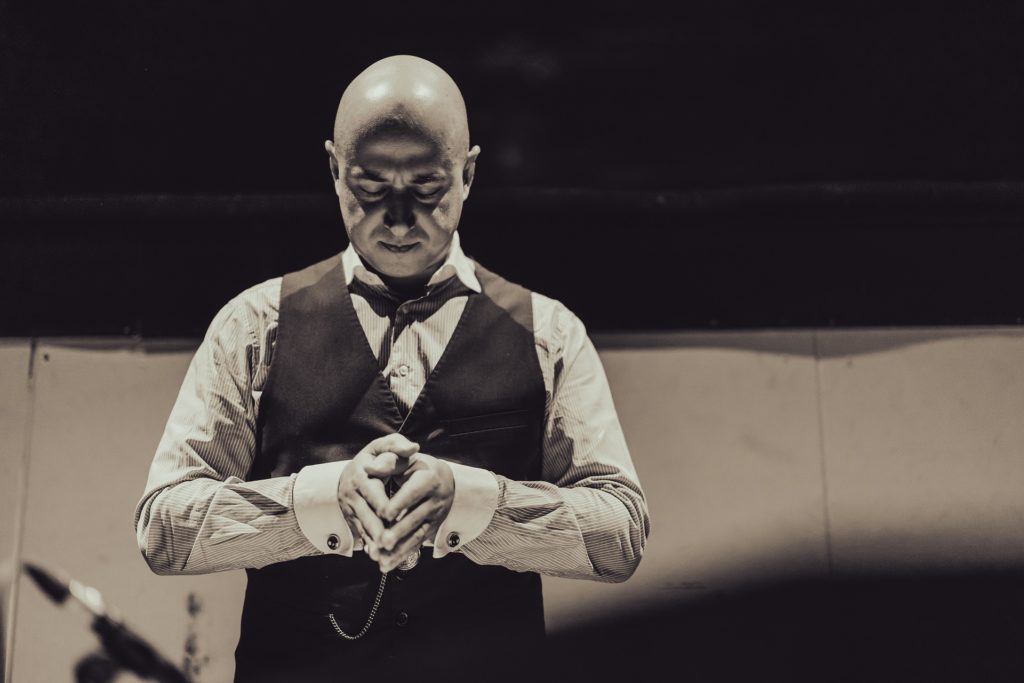
In addition to opera, you also excel in church music. Your studies in São Paulo include church music, choral conducting and orchestral conducting. Well, if we say church music, it is definitely not only Bach, right?
I love Gregorian chant and I also sing it. I really love singing that and I help in my church a lot. I play the organ and I also sing sometimes Gregorian chant, it depends a lot on the Priest.
Is it a choir or you sing solo? I can fully understand you; Gregorian chant is a pure beauty. And you don´t need any polyphony and it still works.
Yes, exactly, it is very strong and fascinating. Most of the time I sing solo, but I also sing in a small ensemble, they are not professionals, but they like it. This and my family completely fill my personal life. It does not need to be professional, because it is not my work. It is my love for this kind of music and love of liturgy that I have. I would say this is my hobby.
I suppose you also know the neuma notations…
Yes, I studied it as well. I’m not saying that I’m completely professional about that, but I know how to read it and how to sing it, even I thought to do a master, but time is not easy. Especially when we have a job and we have to move around. Maybe one day, who knows?
We´ve mentioned Brazil. Currently, it is a big trend in the world to bring different national music to the stage. Are you not planning to bring the works of Brazilian composers to Europe?
Five years ago I had a plan to bring an opera by Carlos Gomes, Brazilian composer to Slovakia. When Karol Kevický invited me as a chief conductor to Košice I told him we had to do something by a composer from Brazil. Not only because I’m from Brazil but I think it would be interesting. And Carlos Gomes was a very famous composer during Verdi´s times and actually at La Scalla the audience preferred Gomez rather than Verdi in his beginnings. His opera Il Guarany was never presented here, they did it once in Budapest. We had everything planned, I had also a good director for this opera, but then after three years the new director came and now I´m not sure if it would be performed.
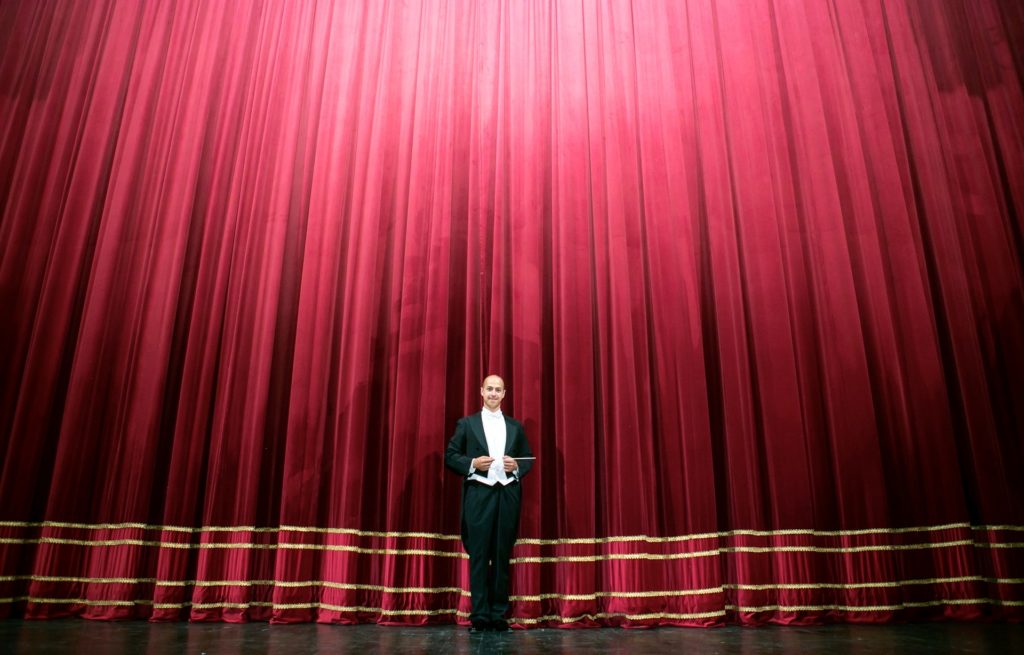
You are the main guest conductor in Košice. Do you like coming here?
For me I really feel like I’m home here. I love working with the orchestra, I love working with the singers and it touches me a really lot to work with them. I’m really very happy and proud and grateful they kept inviting me here. Even after the change of the management, the new director keeps inviting me and I also conduct premiers. I’m very happy for that. I love coming to Košice not only because of the music but because of the food and especially because of the beer. (Laughing)
Zuzana Vachová
Photo: Joseph Marčinský


